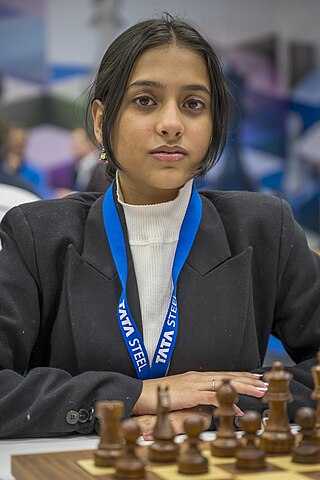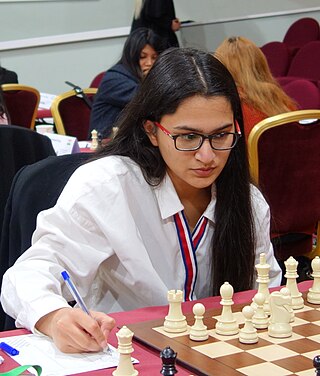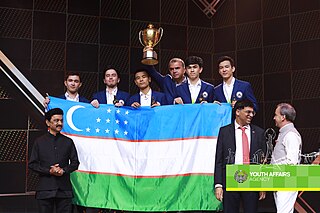
The 38th Chess Olympiad, organized by FIDE and comprising an open and a women's tournament, as well as several other events designed to promote the game of chess, took place from 12 to 25 November 2008 in Dresden, Germany. There were 146 teams in the open event and 111 in the women's event. In total, 1277 players were registered.

Harika Dronavalli is an Indian chess player who holds the FIDE title of Grandmaster (GM). She was part of the gold winning women's team at the 45th Chess Olympiad in 2024. She has won three bronze medals in the Women's World Chess Championship, in 2012, 2015 and 2017. Harika was honored with the Arjuna Award for the year 2007–08 by the government of India. In 2016, she won the FIDE Women's Grand Prix event at Chengdu, China and rose up from world no. 11 to world no. 5 in FIDE women's ranking. In 2019, she was awarded the Padma Shri for her contributions towards the field of sports.

The 40th Chess Olympiad, organised by the Fédération Internationale des Échecs and comprising an open and women's tournament, as well as several events designed to promote the game of chess, was an international team chess event that took place in Istanbul, Turkey, from 27 August to 10 September 2012. The city also hosted the event in 2000.

Vladimir Vasilyevich Fedoseev is a Russian chess grandmaster playing for Slovenia. He is the reigning European champion in Rapid chess and Chess960. He competed in the Chess World Cup in 2015, 2017, 2021 and 2023.

The 42nd Chess Olympiad, organised by the Fédération Internationale des Échecs (FIDE) and comprising an open and women's tournaments, as well as several events designed to promote the game of chess, was an international team chess event held in Baku, Azerbaijan, from 1 to 14 September 2016. It was the first time that the Chess Olympiad had been hosted in Azerbaijan, the birthplace of former world champion Garry Kasparov; however, Azerbaijan had previously hosted strong tournaments, including the annual Shamkir Chess super-tournament in memory of Vugar Gashimov (1986–2014) and the Chess World Cup 2015.

Vidit Gujrathi is an Indian chess grandmaster. Gujrathi attained the title of grandmaster in January 2013, becoming the 30th player from India to do so. He is the fourth Indian player to have crossed the Elo rating of 2700. He is a double gold medalist at the Chess Olympiad. He is also a silver medalist at the Asian Games. He became the third Indian to qualify for the Candidates tournament by winning Grand Swiss 2023.

Zhansaya Abdumalik is a Kazakhstani chess player who holds the title of Grandmaster (GM). She is the first Kazakhstani woman, and the 39th woman overall, to earn the GM title. Abdumalik has a peak FIDE rating of 2505 and has been ranked as high as No. 11 in the world among women. Abdumalik has been a two-time girls' World Youth Champion as well as a girls' World Junior Champion. She is also a two-time Kazakhstani women's national champion, and has represented Kazakhstan in women's events at the Chess Olympiad, World Team Chess Championship, and the Asian Nations Chess Cup. On April 20, 2022, Zhansaya became the President of the Almaty Chess Federation.
The women's event at the 42nd Chess Olympiad, organised by the Fédération Internationale des Échecs (FIDE), was held from 2–13 September 2016 in Baku, Azerbaijan. It is contested by a record number of 142 teams representing 138 nations. Azerbaijan, as host nation, field three teams, whilst the International Physically Disabled Chess Association (IPCA) and the International Chess Committee of the Deaf (ICCD) each provide one team. A total number of 693 players are participating in the women's event.

The 43rd Chess Olympiad, organised by the Fédération Internationale des Échecs (FIDE) and comprising open and women's tournaments, as well as several events designed to promote the game of chess, was an international team chess event held in Batumi, Georgia, from 23 September to 6 October 2018. This was the first Chess Olympiad to take place in Georgia with the Georgian Chess Federation also hosting the Chess World Cup 2017 in Tbilisi.
The open event at the 43rd Chess Olympiad was held from 24 September to 5 October 2018. It was contested by a record number of 185 teams, representing 180 nations. Georgia, as host nation, fielded three teams, whilst the International Braille Chess Association (IBCA), the International Physically Disabled Chess Association (IPCA), and the International Chess Committee of the Deaf (ICCD) each provided one team. A total of 920 players participated in the open event.
The women's event at the 43rd Chess Olympiad was held from 24 September – 5 October 2018. It was contested by a record number of 151 teams, representing 146 nations. Georgia, as host nation, fielded three teams, whilst the International Braille Chess Association (IBCA), the International Physically Disabled Chess Association (IPCA), and the International Chess Committee of the Deaf (ICCD) each provided one team. A total of 747 players participated in the open event.

Arjun Erigaisi is an Indian chess grandmaster. A chess prodigy, he earned the title of grandmaster at the age of 14 years, 11 months, 13 days. In September 2024 he became India's top rated player, and in December 2024 he achieved his peak rating of 2801 which makes him the fifteenth-highest rated player in history and second Indian ever to cross the 2800 threshold after Viswanathan Anand.
Carissa Shiwen Yip is an American chess player and the winner of the 2021, 2023, and 2024 U.S. Women's Chess Championship. In September 2019, she was the top rated female player in the United States and the youngest female chess player to defeat a grandmaster, which she did at age ten. In October 2019, she became the youngest American woman in history to qualify for the title of International Master until surpassed by Alice Lee in June 2023.

Divya Deshmukh is an Indian chess player who holds the title of Woman Grandmaster and International Master. She is a three-time gold medalist at the Olympiad. Deshmukh has also won multiple golds at the Asian Championship, the World Junior Championship as well as the World Youth Championship.

Vantika Agrawal is an Indian chess player who holds the FIDE titles of Woman Grandmaster and International Master. She is a three-time gold medalist at the Chess Olympiad including two gold medals at the 45th Chess Olympiad in 2024 at Budapest. She won a silver medal with the Indian Team at the Hangzhou 2022 Asian Games. Agrawal's accolades also include medals in Commonwealth, World Youth, Asian Youth and National Championships.

The open event at the 44th Chess Olympiad was held from 29 July to 9 August 2022. It was contested by a record number of 188 teams, representing 186 nations. India, as host nation, fielded three teams. A total of 937 players participated in the open event.
The women's event at the 44th Chess Olympiad was held from 29 July to 9 August 2022. It was contested by a record number of 162 teams, representing 160 nations. India, as host nation, fielded three teams. A total of 799 players participated in the women's event.

The 45th Chess Olympiad was an international team chess event organised by the International Chess Federation (FIDE) in Budapest, Hungary, from 10 to 23 September 2024.
The open event at the 45th Chess Olympiad was held from 11 to 22 September 2024. It was contested by a record number of 197 teams, representing 195 nations. Hungary, as host nation, fielded three teams. A total of 975 players participated in the open event.
Dana Kochavi is an Israeli chess player. She is a FIDE master, having won that title in 2024.


















